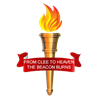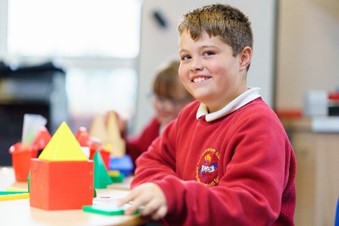Maths Curriculum Statement
Intent
At Clee Hill Community Academy, our maths curriculum is based on the principles of Teaching for Mastery. Mastering maths means pupils acquiring a deep, long-term, secure and adaptable understanding of the subject. The phrase ‘teaching for mastery’ describes the elements of classroom practice and school organisation that combine to give pupils the best chances of mastering maths. Achieving mastery means acquiring a solid enough understanding of the maths that’s been taught to enable pupils to move on to more advanced material.
Five Big Ideas in Teaching for Mastery
Coherence
Connecting new ideas to concepts that have already been understood, and ensuring that, once understood and mastered, new ideas are used again in next steps of learning, all steps being small steps
Representation and Structure
Representations used in lessons expose the mathematical structure being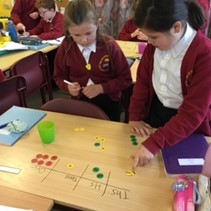 taught, the aim being that students can do the maths without recourse to the representation
taught, the aim being that students can do the maths without recourse to the representation
Mathematical Thinking & Reasoning
If taught ideas are to be understood deeply, they must not merely be passively received but must be worked on by the student: thought about, reasoned with and discussed with others. We encourage all pupils to use and explain their choices of strategies whilst continuing to deepen their number sense. Through increased opportunities for reasoning, pupils articulate ‘why’ and ‘how’ and are encouraged, through questioning, to explain their ideas further. They are encouraged to ask questions; developing a curiosity for number and enjoyment of maths. They extend their understanding and explore alternative ways to find solutions.
Fluency
Quick and efficient recall of facts and procedures and the flexibility to move between different contexts and representations of mathematics
Variation
Varying the way a concept is initially presented to students, by giving examples that display a concept as well as those that don’t display it. Also, carefully varying practice questions so that mechanical repetition is avoided, and thinking is encouraged.
https://www.ncetm.org.uk/resources/50042)
We use our understanding of the current and prior attainment of pupils to build on and deepen their understanding of mathematics; embedding key concepts and challenging all learners. Our aim is to inspire children to work with mathematical curiosity; exploring all aspects of maths and enjoy working to solve problems.
Having a mathematical mindset
We promote a good mathematical mind set amongst staff and pupils within a mastery approach to mathematical understanding where all pupils can achieve and a ceiling is not placed upon learning. At all stages, pupils can select manipulatives to support and deepen their learning and are encouraged to take an increasing responsibility for their learning.
Implementation
The Ofsted Maths Review (May 2021) states that mathematical curriculum knowledge is classified into three types, declarative, procedural and conditional.
Declarative knowledge can be prefaced with the sentence stem ‘I know that’ and consists of facts and concepts.
Procedural knowledge can be prefaced with the sentence stem ‘I know how’ and consists of a sequence of steps.
Conditional knowledge can be prefaced with ‘I know when’ and focuses on strategies to reason and problem solve.
The review states that when children use each of these types of knowledge (declarative, procedural, conditional) their knowledge of the relationships between concepts develops over time. Consequently, when looking at the pedagogical approaches that support this knowledge, we plan to provide opportunities that enable our children to practise and apply these facts, concepts, methods and strategies. Our lesson structure allows for this and further daily discrete fluency sessions are taught to ensure that all children have opportunities to do this.
White Rose
Using the White Rose materials to support learning, we have a mastery approach to learning where all children are given the opportunity to succeed in maths. A positive ‘can-do’ attitude/good mathematical mind set where all pupils can achieve and a ceiling is not placed upon learning.
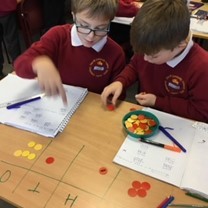
Pupils use and explain their choices of strategies whilst continuing to deepen their number sense. Through increased opportunities for reasoning, pupils articulate ‘why’ and ‘how’ and are encouraged, through questioning, to explain their ideas further. They are encouraged to ask questions; developing a curiosity for number and enjoyment of maths.
Children develop their conceptual understanding of mathematics by using concrete objects, pictorial representations and abstract thinking. At all stages, pupils are able to select manipulatives to support and deepen their learning and are encouraged to take an increasing responsibility for their learning.

Flashback 4 is a series of quick questions covering something from the previous lesson, last week and topics from earlier in the year – maybe even last year! This resource helps to recap and ensure essential skills are regularly revisited and retrieved to strengthen retention. In addition to this, every half term, each year group has a Key Instant Recall Fact (KIRF) to learn and these are practised during this time.
NCETM
We are part of the NCETM's Mastering Number Project. This aims to secure firm foundations in the development of good number sense for all children from Reception through to Year 1 and Year 2. The aim over time is that children will leave Key Stage 1 with fluency in calculation and a confidence and flexibility with number. Attention is given to key knowledge and understanding needed in Reception and progression through KS1 to support success in the future. The NCETM spine materials are also used to support teachers with recommended teaching sequences, and professional development for staff in embedding the mastery approach. Staff regularly take part in workshops run by SHaW Maths Hub.
Times Tables Rock Stars is used in Key Stage 2 to develop fluency of multiplication and division facts, and to develop speed of recall for known facts. Weekly tests on number bonds are taken by all pupils in the school ensuring children learn and retain the essential number facts so they can focus on mathematical methods. The scheme enables staff and parents to assess and review learning, look at heat maps showing strengths and areas to develop and weekly celebration certificates to keep pupils motivated.
“My child is really enjoying using TTR and learning through such a fun way.”
Alongside the online activities, we run weekly times tables paper checks to track progress with 60 questions to answer in 5 minutes. Pupils progress through the times tables at their own pace and earn certificates to celebrate their success.

Enrichment Opportunities
Maths Challenges – Year 4,5 and 6
At Maths challenge interschool competitions, pupils participate in various mathematical tasks such as working with dice, pentominoes, playing cards, dominoes, tangrams and counters. It’s great fun and an opportunity to celebrate maths challenges in a competitive way.
Maths workshops
Our Maths Workshops provide an opportunity for parents to come into school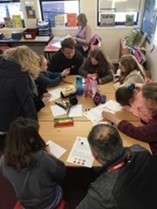 and work alongside their child, finding out more about how Maths is taught at CHCA and ways in which they can support their child at home. For more information, please visit http://chcacademy.co.uk/parents/parent-workshops/mathematics
and work alongside their child, finding out more about how Maths is taught at CHCA and ways in which they can support their child at home. For more information, please visit http://chcacademy.co.uk/parents/parent-workshops/mathematics
SGET Battle of the Primary Schools
The children really enjoyed the competitive nature of this times table battle and all of their hard work paid off with a 1st place.

Special Maths Days
Celebrating times table rockstars with fancy dress, times table activities and a parent workshop to show their parents ways in which they practise their times tables. The ‘Rolling times tables’ was great fun!
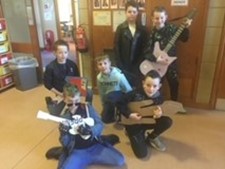
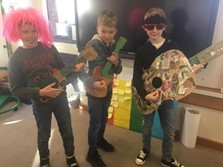
Supporting Pupils
When formative assessments show that pupils have not grasped a concept within a lesson, they will be offered further support, often in the form of a ‘keep up’ session with the TA or teacher. Wherever possible, this will take place before the next maths lesson.
When summative assessment show that pupils may need additional support with key areas of maths, interventions are used to provide additional time to embed key concepts 1:1 or in small groups. The school uses National Tutoring Funding to support some pupils with additional out of school hour tutoring free of charge.
At Clee Hill Community Academy, we also believe that providing opportunities for regular recall of key knowledge is beneficial. The recent OFSTED ‘Research Review Series’ for mathematics stated that:
‘Frequent, low-stakes testing of taught content can help prepare pupils for summative tests by providing memory-enhancing opportunities to recall and apply taught content. Tests should therefore be aligned closely with curriculum sequences because generic tests are not able to give this feedback.'
In KS1, recall opportunities are built into the Mastering Number Programme. In KS2, staff use a range of resources for recall purposes, such as the White Rose ‘Flashback 4’ Opportunities for children to recall times tale facts are built into lessons.
Maths in the EYFS
Our aim is for Early Years Maths is to ensure that all children develop firm mathematical foundations in a way that is engaging, and appropriate for their age. Mathematics in the Early Years Foundation Stage Curriculum comes under two strands, each of which has an Early Learning Goal:
Number Early Learning Goal
- Have a deep understanding of number to 10, including the composition of each number; - Subitise (recognise quantities without counting) up to 5; 

- Automatically recall (without reference to rhymes, counting or other aids) number bonds up to 5 (including subtraction facts) and some number bonds to 10, including double facts.
Numerical Patterns Early Learning Goal
- Verbally count beyond 20, recognising the pattern of the counting system;
- Compare quantities up to 10 in different contexts, recognising when one quantity is greater than, less than or the same as the other quantity;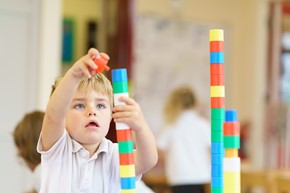
- Explore and represent patterns within numbers up to 10, including evens and odds, double facts and how quantities can be distributed equally.
The Early Learning Goals define the level of development children are expected to attain by the end of the Reception year. The vast majority of pupils at Clee Hill Community Academy achieve these Early Learning Goals.
As with all other Areas of Learning, the teaching and learning of mathematics in our Nursery and Reception classes takes place both indoors and outdoors through a wide range of practical and "hands on" activities.
The staff use their knowledge and expertise to plan for a high quality learning environment which provides children with lots of opportunities to explore different aspects of number and shape, space and measures and learn new concepts. The children have a wide range of structured play resources available to them throughout the year - this is known as "continuous provision". The adults model the use of these resources and the appropriate mathematical language as they support the children in their play.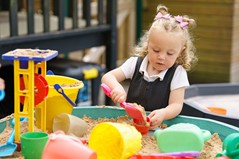
For example, children learn about capacity through their sand, mud and water play indoors and outdoors. They use containers of different shapes and sizes to measure and compare.
Children develop their knowledge and understanding of shapes and their properties through their experiences of activities such as junk modelling and block play. Blockplay also offers children the opportunity to develop their knowledge and understanding of some key concepts relating to number such as "Conservation of Number" which means knowing that when a group of objects are moved around the total remains the same. This is a prerequisite skill to calculation. 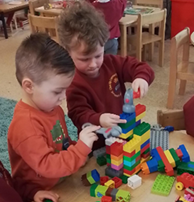
We also develop children's early counting and number skills using resources such as board games and dice, number tracks, 5 or ten grids, dominoes and Numicon. Our outdoor activities include plenty of opportunities for children to count and read and write numbers, such as games using targets or games involving scoring and adding up points such as skittles.
Our Early Years Curriculum
As part of our EYFS curriculum, there are milestones which have been carefully constructed with an end goal, to reflect our own dynamics and environment to meet our children’s needs, whilst ensuring a stimulating, challenging and diverse curriculum. Although many aspects of the Early Years Curriculum develop a solid understanding for Maths in Year 1, 'A Master of Maths' and 'An independent Problem Solver' are of particular importance to show the progression of learning through Nursery and Reception.
Nursery and Reception Milestones
Maths Challenge in Reception
In our Reception class, we set regular Maths Challenges to further develop mathematical thinking. These include problem solving tasks on the maths table, maths stories, exploring shapes and patterns and discovering different ways to look at the composition of numbers. 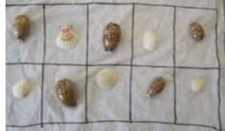
We also use tens frames as part of our learning which help pupils to subitise or recognise numbers without counting.
Songs and rhymes
In Nursery and Reception, children are encouraged to repeat songs and rhymes, many of which help teach and secure maths knowledge.
Impact
We hope that through following our cohesive and progressive curriculum, all children will make at least expected progress in maths and will become confident mathematicians who enjoy the subject. We measure children’s attainment in a number of ways to ensure they are making good progress. Where our assessments inform us that children are not making expected progress, we act to support children to keep up with their peers.
